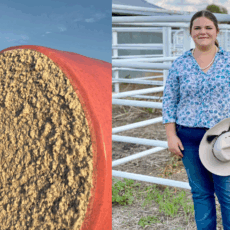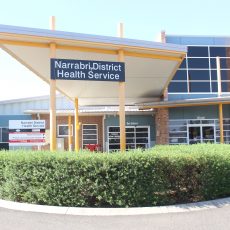How many kids in Narrabri can fly a plane before they can drive a car? Well, quite a few thanks to Ken Flower, and 16-year-old Digby Chiplin is one of two to have recently earned his recreational pilot certificate.
Curiosity to pilot a plane hit Digby at 12 years old after a successful skydiving experience which naturally prompted his parents to get him a flying lesson for his 13th birthday.
While Digby was apprehensive at first, he proceeded to let his parents birthday-nap him at the crack of dawn for a “surprise” flying lesson: he knew where he was going.
As soon as he got up in the air the bug hit him, and he knew he wanted to learn more.
“I told Ken, and he said: “well, you’ve pretty much done your first lesson so put that in your books,” said Digby.
Digby has just completed the first stage of his piloting journey, clocking over 65 hours of flying, which includes tackling a rigorous study and exam schedule to match.
Getting your recreational certificate means that you can take off in a two-seater plane and conduct solo flights within 24 miles of the airport.
Ken has taught many, many pilots and instructors, of which many have been under 17 years of age; I’ve taught boys and girls who have been talking about flying since they were six years old,” said Mr Flower.
“I had one student from 15 years old who went on to get their commercial licence and now flies for Specialised Aviation in Narrabri and another who is flying C42s for the air force.”
“Kids are very easy to teach and pick up the skills of flying a plane very fast.
“And they are all very different, some are very academically smart, some are not – but tend to improve significantly because they have the interest to get through the five exams.”
Flight training, whilst expensive, is lower than it used to be due to the lower cost of a modern two-seater aircraft.
Flight training requires a steady commitment to regular flying, study and examinations, and a pass is needed to continue ascertaining each level.
“What I’ve found is that the flight training process helps kids with their schoolwork because for exams you get a technical pass or fail,” said Mr Flower.
“They learn rigor and a definite skill.”
So, what makes a good pilot?
“Focus, good decision-making, and self-control are the three things that make you a good pilot,” reckons Digby.
Luckily, he’s dedicated to the process and is willing to see it through, an impressive addition to his schedule, alongside his daily high school commute: a one-hour bus trip to St Mary’s College in Gunnedah.
“You have to get up early in the morning, which is hard, but I want to do it, so I get it done,” said Digby.
“But flying is like a weekend sport, it only affects your school if you let it.
“I would go home, do all my school homework, then study a little extra – just like I’m going to training.”
Mr Flower started his flying journey at age 29 and has gone on to fly in many countries and instruct hundreds of students in Australia and South Africa.
“Being an instructor is the best job in the world, I love flying, but it’s more purposeful to train someone to then spend their life flying,” said Mr Flower.
“These kids can fly even before they have a learner’s permit to drive – they are very capable and become highly skilled because they learn risk management and that any mistakes are very costly – there are very few fields other than aviation that we do risk management as well in.”
A highlight for Ken is flying the students to see their houses and farming properties in their first three hours of training.
“I get my students to fly to where their house is, and some of the farm boys get to see their house and property from the air for the first time, and they all take pictures,” said Mr Flower.
“For many it’s the first time they’ve ever seen the Namoi River, the Warrumbungles, or Kaputar from the air, it’s a special experience.”
Digby’s biggest accomplishment to date is conducting his first solo flight in February.
“It was great, but I was so scared,” said Digby.
“It was so strange, because having Ken there, if you forget something you can ask, but I couldn’t ask him because that’s not good flying.
“So, I went over procedures, and read up the night before I went out and on the ride over.
“It was stressful – but when I was done, I wanted to do it all over again.
“It’s so amazing being up there, piloting a plane is something that no one else is doing and just getting to see everything and go through all the technical stuff was good.”
As far as being thrown in the deep end goes, a rite of passage in the air is having the engine turned off by your Chief Flying Instructor and being passed the controls.
“We turned the engine off one time when coming back in a big plane as Ken said it was better for gliding,” said Digby.
“We went to about 5,000 feet, lined up with the runway, then pulled the power off and came in for a landing without the propeller going.
“It was very scary when Ken did it, – and he said, “Now you’re going to fly it: your plane.”
“It was terrifying, seeing the propeller not in motion was probably the scariest part.
“I’m all the way up here, nothing is pulling me forward, and we’re just floating.”
Digby’s dreams of becoming a pilot will leave him with two options after graduating high school; joining a flight school or the Australian Airforce, and then it’s on to either flying large commercial aircraft all over the world or becoming a pilot for the Rural Doctors Association.“I don’t want to be a plumber, which was an option, but nothing else sounded interesting.
“I don’t really want to be an astronaut, but I’d love to go for a walk on the moon.”
“I want to fly over oceans and big mountains and valleys, any icy snowy place like Canada or Alaska to see the different landscapes.”
Next up, Digby will work towards his Navigation certificate, which will qualify him for conducting flights anywhere in Australia as well as navigating to different airports and reading forecasts.
So how does it feel to have a pilot’s licence before a driver’s licence?
“I would have to get back to you on that because I haven’t got my driver’s licence yet, but it doesn’t feel like it’s something you should be doing until your 30s,” said Digby.
And what advice does Ken Flower have for future pilots dreaming of take off?
“Whether flying is your first dream or a mature age dream, you should pursue it.”
“There are people who have wanted to fly all their lives but put it off until they retire then say, “I absolutely love this, why didn’t I do this decades ago?”
“It’s never too late or too early to pursue it.”
To order photos from this page click here










